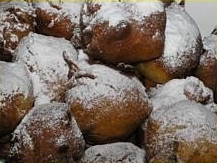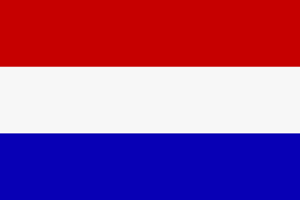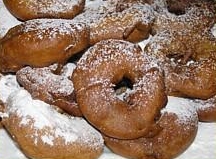 |
 |

Dutch
recipes

Belgian
recipes
|
 |

|

Dutch
recipes

Recipes
from Limburg
|
 |

New Year
recipes |
|
|
Oliebollen (Dutch
fritters)
Smoutebollen
|
|
Appelflappen (apple
fritters)
|
- 500 GRAM FLOUR
- 100 GRAM RAISINS
- 25 GRAM PRESERVED
GINGER, chopped
- 1 APPLE, peeled, cleaned and chopped
- 1 TBSP SUGAR
- RIND FROM 1 LEMON
- 1/2 TSP CINNAMON
- 1 TSP YEAST
- 150 GRAM BEER
- ICING SUGAR
|
|
- 175 GRAM SELF RAISING FLOUR
- 5 APPLES, peeled
- 175 GRAM MILK
- 1 EGG
- 50 GRAM SUGAR
- 1 TSP CINNAMON
|
Mix all the ingredients together and stir in 350
gram water. Allow the batter to rise for one hour. Use two tablespoons
or an ice-scoop spoon to make balls out of the batter and fry those
7 minutes at 160 degrees Celsius.
Turn them halfway if necessary. Serve with icing sugar.
|
Drill the core out of the apples and cut them in
four slices. Mix the sugar with the cinnamon and sprinkle over the apples.
Leave the half an hour. Make batter out of flour, milk and egg. Dip
the apple slices in the batter and deep fry them at 180 degrees
Celsius.
|
Finding an English translation for "Oliebollen" (smoutebollen
in Belgium) was hard, the best one
that came up was "Dutch
doughnut", according to Wikipedia.
To me, however, a
doughnut is a not the same thing and has a different shape, the dough
is different and it has a hole in the middle. Luckily, one of my
readers indeed confirmed the demand for an oliebol to have a hole to
be a doughnut, and that the right name should be fritters. The Dutch eat their oliebollen
and appelflappen on "Oudjaarsavond", New Year's Eve. When I was small,
my grandfather used to bake literally buckets full of them, and I remember
the house smelling of sweet baking and us eating them the whole evening
and having our breakfast on the first of January with the leftovers.
Nowadays, we bake only 20 or so, as it is not considered healthy any
to eat so much deep fried food. On Worldcook's New Year page
you will find New Year recipes from all over the world.
|
